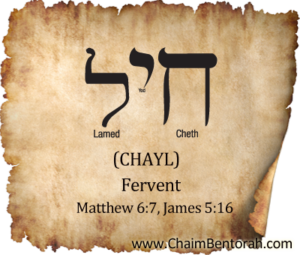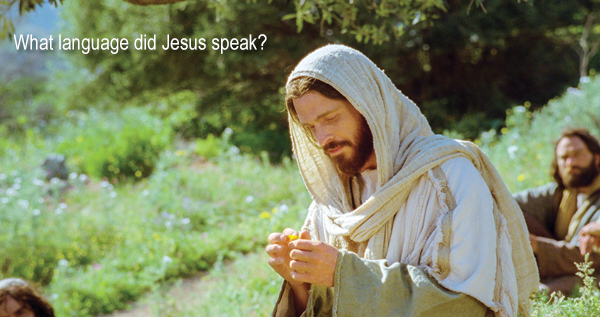Aramaic Word Study – Fervent – Chayl Cheth Yod Lamed
Matthew 6:7: “But when ye pray, use not vain repetitions, as the heathen do: for they think that they shall be heard for their much speaking.”
James 5:16: “Confess your faults one to another, and pray one for another, that ye may be healed. The effectual fervent prayer of a righteous man availeth much.”
 The word in Aramaic here for prayer is tsala’ which is the same root for roasting meat or baking. Roasting meat suggests an intensity. Tsala’ is a great expression of emotions such as sorrow, anger, or urgency which is often colloquially expressed as heat. Even in English, we speak of a “heated” argument. That is an argument that is filled with passion and anger. When an animal, like a dog, is seeking intimacy with another animal, we say it is in heat. Passion is an expression of heat. Hence the prayer that Jesus is referring to here is one filled with emotion and passion.
The word in Aramaic here for prayer is tsala’ which is the same root for roasting meat or baking. Roasting meat suggests an intensity. Tsala’ is a great expression of emotions such as sorrow, anger, or urgency which is often colloquially expressed as heat. Even in English, we speak of a “heated” argument. That is an argument that is filled with passion and anger. When an animal, like a dog, is seeking intimacy with another animal, we say it is in heat. Passion is an expression of heat. Hence the prayer that Jesus is referring to here is one filled with emotion and passion.
Hannah’s prayer in I Samuel 1:10: “And she was in bitterness of soul, and prayed unto the LORD, and wept sore” serves as a model for Jewish prayer. She was so passionate in her prayer for a child that the High Priest Eli accused her of being drunk. Here in Hebrew the word for prayer is palal, the notch in a tent peg. It has the idea of tightly clinging to its peg or anchor.
James talks about the effectual fervent prayer. The King James translators chose the English word fervent because it expressed a display of passionate intensity. Most Greek scholars teach that the word for effectual fervent which is energoumene would be better rendered as energetic, passionate, sincere, hearty and/or earnest. It involves words that flow from one’s very heart and soul. Some commentators suggest that it is a reference to the kind of prayer that is motivated by the Spirit of God.
In the Aramaic, the word used for effectual fervent is chayl which is an intense concentration of power and resources. Again, this is the idea of a passionate expression of one’s heart and soul. Chayl is a form of dancing that was considered an expression of worship and praise. It has the idea of spinning in a circle as a child will spin around in a circle out of pure joy. In fact, chayl was a form of worship for children by spinning themselves in a circle. I recall attending a worship service and in the midst of the worship which allowed for a free expression of one’s joy and love for God, I saw a small child, no more than five or six years old, run into the aisle of the sanctuary and just spin around in a circle out of pure joy. She was just expressing the deep passion she felt and spinning in a circle was the release of that passion.
To really express your true passion you need to focus intensely on the object of your passion. I recall hearing an art historian speak of an elderly curator at an Art Museum in France who told him that as a child he met the great impressionist painter Monet. He told how one cold winter day he and his father took a walk along the frozen Rhine River. His father said: “I bet we will meet Monet today.” Sure, enough they came upon Monet, an elderly man sitting on a stool before an art easel painting some scene that captured his attention. As they approached, Monet stood up to greet them and as he did, he took off his hat. It was well below zero out and this curator, even as a small child, was amazed to see steam rising from his head when he removed his hat. Monet had been so passionate, so chayl – intense in his painting that he actually worked up a sweat in that subzero temperature. That is the idea behind a fervent passionate prayer.
We tend to get two extremes when it comes to prayer. There are those who say you should only pray for something once and then just leave it alone, no need to keep praying for something once you have made it known to God. Then there is the other extreme which instructs us to pray continually for something over and over, don’t give up praying, your persistence will finally win through. Jesus is not referring to those who are constantly praying for something nor is He saying that you need only to ask once. He is making a reference to the sincerity of our prayers.
Some people just pray out of obligation. I ran into this all the time when I was a pastor. For some reason my seminary degree and ordination as a minister of the Gospel made me the target of the guy to give an invocation, to offer a blessing for a meal, or to start off some business meeting with a word of prayer. How often have I heard the words; “Let’s invite the Lord into this meeting” as if he were not already present? I would then need to offer some words which sounded pious and holy to relieve everyone’s conscience that we did our duty and gave our proper loyalty oath, like a pledge of alliance to some flag. Did anyone actually listen to my holy words? Did God? If you were God, would you listen to these words?
Normally, they were the same old same old. “Father, we thank you for the blessings of this day…” I recall one deacon who was so caught off guard to open a meeting in prayer that he really did not have a chance to formulate the right words and he began his prayer for this business meeting with, “Lord we thank you for this food.”
We treat God like some insecure dictator who needs constant reassurance that He is wonderful and deserving of our loyalty. So, like faithful subjects our words are filled with all sorts of praise and fine words meant to not only impress our “celestial dictator” but those around us who are listening in.
I get a lot of praise for my books and some of the things I write. Sometimes it is sincere, but many times I sense the praise is more patronizing. The words are kind and helpful but often seem very condescending to the point of just simple flattery. That is the words seem almost like excessive compliments for the purpose of ingratiating oneself to me.
God is not so insecure that He needs to surround Himself with a lot of yes people who will praise and honor just to ingratiate themselves with Him. Our praise and worship are only acceptable to God when it is given with a heart filled with love and adoration. When we love someone, we just need to express that love. Worship and praise are more for us and our need to express our love for God than it is for God’s ego.
Along the same lines, we do not flatter God with a lot of vain words and much speech on how wonderful He is just to get an answer to our prayer. In fact, such words are an abomination to Him. He is more interested in the sincerity of our hearts and the words that flow from our hearts.
May we never pray one word that our hearts have not first spoken?
Hi there! Thank you for reading this Daily Word Study. Can I ask a favor? Share this Daily Word Study with your friends on Facebook and Twitter by clicking one of the icons below.
Thanks & Blessings, it means a lot to me!








If I remember correctly you did another study where chayil also had the connotation of entering battle.
Would that be included in this context?
Love this 💝
I am glad you get praise. You are making a difference. Thank you for being in my inbox. It gives me hope. my heart is sore and I will not stop praying because He is all I know anymore. bless you and the Hebrews for Christian folks.
The news from Israel is scary. woke schools, goats at the Temple Mount. it is the beginning of the glory coming..I just want people to wake up.
Amen